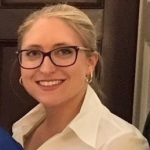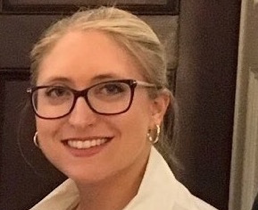We’re taking time over the following weeks to get to know the members of the GSA’s Early Career Scientist Committees. Join us every week to learn more about our 2019 early career scientist advocates.

Emma Powell
Co-Chair, Policy Subcommittee
University of California, San Francisco
Research Interest
I use yeast as a model organism for my research because, at the level of a single cell, yeast are remarkably similar to humans and provide us with a variety of genetic tools to ask mechanistic questions about how cells function. As cells grow and divide, they must integrate a variety of environmental signals. Changes in cellular environment, such as nutrient availability, chemically alter proteins, regulating how they function. One of these chemical modifications, phosphorylation, is added to proteins by enzymes called kinases and can make proteins more or less active depending on how this modification occurs.
My research centers around characterizing an unknown kinase in yeast that is responsive to nutrient changes in the cell and may be involved in regulating carbohydrate biosynthesis. By phosphorylating proteins involved in carbohydrate biosynthesis, cells can fine-tune how much carbohydrate they synthesize depending on their environment and growth state.
Studying how cell growth and environmental signals regulate a carbohydrate synthesis pathway in yeast may seem far removed from our own health, but this type of inquiry can provide us with a deeper understanding of how protein regulatory networks function. Understanding how these pathways are regulated in a healthy yeast cell informs our understanding of how disease misregulates similar pathways in our own cells.
As a PhD-trained scientist, you have many career options. What career paths interest you the most?
I’m interested in bridging the gap between scientific discovery and societal impact. There is often a disconnect between scientists and policymakers; scientists aren’t always focused on communicating the importance of their research to policymakers and the general public, but advocacy and outreach are an essential part of being a scientist. Communicating the impact of science to the general public also helps to advance the scientific enterprise by increasing people’s awareness of the value of science in their own lives. As our scientific and technological advances propel us forward, the need to emphasize societal engagement will increase.
Writing Op-Eds, white papers, and policy memos are ways that scientists can engage with the societal implications of the work we do as scientists and facilitate evidence-based policy-making. During my time as a graduate student at UCSF, I organized a series of workshops for the entire campus community on writing both Op-Eds and policy papers. These workshops have been hugely popular on campus and resulted in several publications, highlighting how these types of writing are powerful tools for assisting the public and legislators in understanding and valuing scientific discovery. Leading a team of students in organizing these events has enhanced my management and leadership skills, which I hope to continue to develop throughout my career. By participating in these workshops, I’ve learned how to write about science and policy for a variety of audiences, which has confirmed my commitment to a career involving policy and communication. I enjoy discussing and explaining scientific research just as much as participating in the discovery process, and I’m interested in careers in science policy and communication that will allow me to continue to actively engage in these activities. I’m also interested in how science policy can be used to enact changes within the scientific community and empower scientists to improve the system by creating a more robust, diverse, and productive scientific research enterprise.
In addition to your research, how else do you want to advance the scientific enterprise?
As scientists, we are the experts on what can or should be done to improve the scientific enterprise. As a graduate student, I have worked to do this on my own campus by helping to change UCSF’s gender harassment policy. I chaired a committee of students and postdocs that hosted a town hall and delivered specific recommendations to university leadership on how UCSF could implement the NASEM recommendations for sexual harassment on our campus. We are now working with the university to implement some of these changes.
I found engaging with groups of stakeholders to improve the work environment to be an incredibly rewarding experience. The response from other trainees and faculty was incredibly positive, and there is now a lot of momentum on campus to enact the changes we suggested, which has made me excited to think about other ways I can help improve the experiences of early career scientists. I look forward to making the scientific research enterprise more robust by working to change the current metrics of success for researchers in biology that aren’t necessarily in the best interest of early career scientists. For example, grant awards and hiring practices are often based purely on individual contributions to papers, rather than emphasizing mentorship and collaboration. I want to help institute policies and foster a culture that more explicitly rewards mentorship and collaboration within the scientific community to help improve the experience of early career scientists and achieve our shared goal of enhancing scientific discovery.
As a leader within the Genetics Society of America, what do you hope to accomplish?
As the co-chair of the Policy Subcommittee, I look forward to leading our team in building resources that provide GSA members with opportunities to learn more about science policy and build their advocacy skills. I’m excited for our committee to work on creating avenues for early career scientists to “get their feet wet” with science policy by learning more about science policy careers and responding to agencies’ requests for information or calls for public comment. Through these activities, I hope our committee can help lower the barrier for members of our community to engage with these important issues. As co-chair, I want to focus on fostering a sense of community within the committee and building members’ confidence. As the future of the scientific workforce, early career scientists should play a role in influencing policy and when they feel supported, they will be able to raise their voices more effectively and share their valuable perspectives on ways to improve the scientific enterprise.
Previous Leadership Experience
- Group Leader — The Science Policy Group, at the University of California, San Francisco
- Committee member — Gender Equity Trainee Taskforce, at the University of California, San Francisco
- Organizer — Advocacy Day, University of California, San Francisco
- Coordinator — Advocating for Science & Scientists seminar series
- Adjunct Faculty — University of San Francisco
Connect with Emma Powell on LinkedIn.































